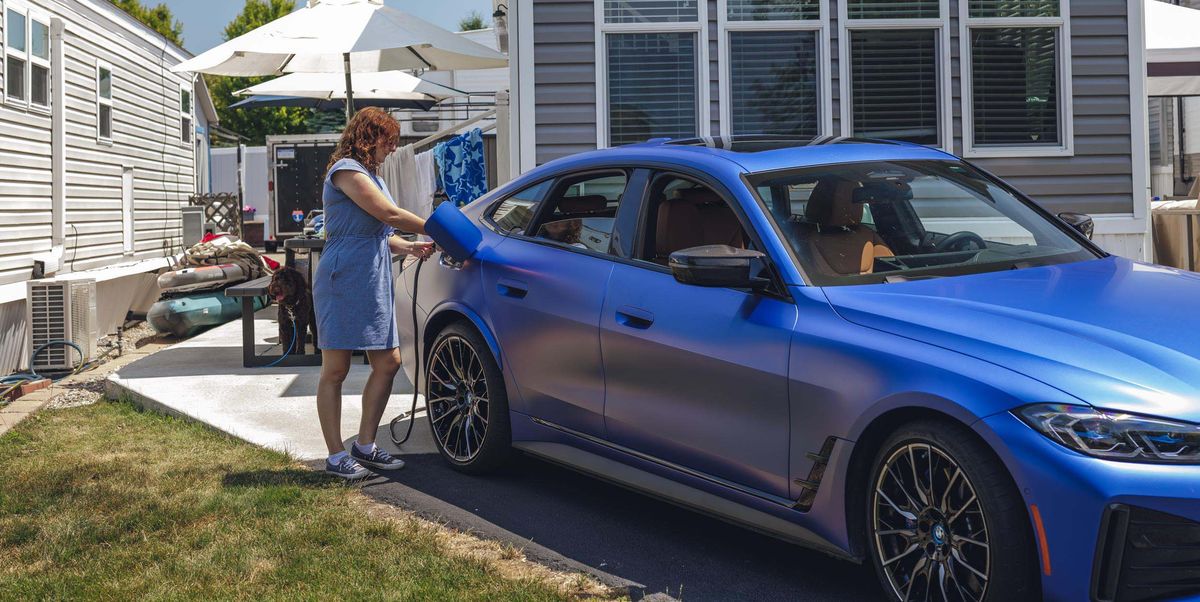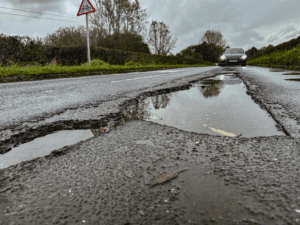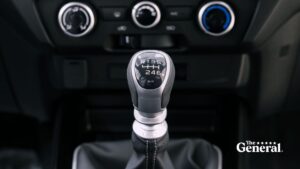No Public Charger, No Problem: Some EV Enthusiasts Let Strangers Juice Up at Their House

From the September 2022 issue of Car and Driver.
One notable entry described itself as “The Watt Family Poodle Farm and Insane Asylum.” The Watt place (yes, really) stands out on the PlugShare list, one of several unexpected private residences among the app’s location and status reviews of public EV chargers. To find out who is inviting total strangers to their garage and why, photographer Michael Simari and I nabbed the key fob to an electric car we figured wouldn’t be too unwelcome in any driveway, a BMW i4 M50, and charted a course along the west coast of Michigan, marking our stops based on PlugShare’s little blue house icons.
Our first destination was a complex of tiny homes a few miles from the beach in South Haven, where, with no answers to our in-app texts, we pulled up in front of a charging Chrysler Pacifica and clumsily asked a woman sitting on the nearby patio if we could borrow some charge. “I’m sorry, what?” she said, looking confused. “Can we plug into your charging station? You’re listed on the PlugShare map.” Her eyes widened, and she started laughing. “Oh my gosh, yes, of course. I’m sorry, I forgot we were on there. Nobody ever uses it.”
Michael SimariCar and Driver
While the BMW slowly collected electrons, we asked the appropriately named Heather Wire (yes, really) why she and her husband offer energy from their vacation home to any passing road tripper. “When we installed the charger a few years ago, there weren’t many public ones, and we wanted to support the technology and push green energy. It’s not that much electricity; it’s not a big deal to share it.”
Our next stop was in Holland (the Michigan one), home to two listings. The first address was down a driveway so long and winding that it cost us another mile of range. It ended at a gorgeous house with no sign of a place to plug in and every sign of a place where you’d get arrested for trespassing. “Go knock on the door,” suggested Simari. “You go knock,” I answered. Neither of us did. If you live in a beautiful house in Holland and are wondering about the two minutes of Ring camera footage of two people arguing in a BMW, sorry, that was us.
Michael SimariCar and Driver
A few blocks away was a cute yellow duplex, again with no visible charging station and no sign that anyone was home. We dithered about the etiquette of knocking for so long that a neighbor came out and asked if we needed help, in the “Do I need to call the police about you?” kind of way. We explained that we’d been sent by a charging-network app, and he smiled forgivingly and suggested a nearby grocery store.
We tried once more, in a rougher neighborhood near Muskegon, one with gangs of wild turkeys strutting around overgrown lawns. The address had a Chevy Bolt in the driveway but no obvious charging capability. Feeling guilty about chickening out on the last two, I knocked on a peeling white door with a broken pane of glass. No answer, and I was glad.
We gave up and used some of our remaining 40 miles to get to a public ChargePoint unit. Both plugs were in use—one by a Volkswagen ID.4, the other a Polestar. The Polestar driver showed up a few minutes later, and we claimed the open slot just before a Hyundai Kona Electric and a Ford Mustang Mach-E joined the parking-lot party. The driver of the Kona checked the charge on the VW (100 percent) and ranted about the rudeness of the owner. The Kona owners were on vacation and had been on the road for a month. They said that while charging was never a big problem, there were occasionally inconveniences like the inconsiderate VW owner. Despite that, they felt the hurdles of EV ownership were worth it, repeating an idea Heather Wire had expressed, that electric-car owners are testing something new, an idea still in its infancy.
Michael SimariCar and Driver
The next morning I had several messages. Some were apologies from folks with vacation homes who weren’t around on weekdays. Several were from people who said they no longer had an EV or had moved and didn’t remember they were on the app. Two offered their electricity.
The first was down a gravel road running the peninsula of Arcadia Lake. I battled spiders on the charging cord while Simari enjoyed the view. Later I spoke to the owner, Paul Warnicke. Like the Wires, Warnicke is an early adopter of electrified vehicles, buying first a Volt and then a Bolt. His shared plug makes sense, being out in a remote area, and he says he gets three to five users a year, usually guests of his neighbors. “Part of it is just to encourage others to consider it. I feel lucky I can do that. It’s a small thing, and it’s a way to give back.”
Michael SimariCar and Driver
We would have happily stayed at Warnicke’s place for the eight hours it would have taken to recharge, but we had one more stop to make, Tim Draeger’s house, in a neighborhood built around a private airstrip. The Draegers bought a Bolt on the recommendation of a friend who worked for GM. They like the low maintenance of the EV and feel like it makes up for doing much of their travel by plane. “I burn a lot of fossil fuels. This feels like a little carbon offset,” said Draeger. He added what by now had become a common refrain: “I like meeting the people in the EV community. The network isn’t here yet, but it’s growing. We’re pioneers.” Like trailblazers in friendly outposts along the Oregon Trail, people like Draeger, the Wires, and Warnicke offer some emergency rations in the wilderness.





